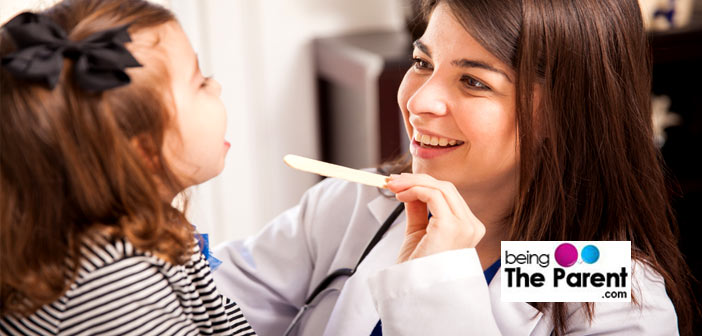
No one, let alone children, likes going to the doctor. But it can be particularly petrifying for the children as they feel they have no control or say in the matter. If you do not have your child’s cooperation, it would make the trip to hospital grueling to you too. Of course, minor fear is quite normal. We are here talking about children who are extremely frightened and anxious. So let us examine why exactly your child is terrified and how to calm him.
Why Is My Child Terrified Of Doctors And Hospitals?
It could be due to any or many of the following reasons:
- Fear of injections: The first 1.5 years of his life, you have been taking your child regularly to the hospital for vaccination shots. While he might forget the visits during the infant months, by the time he is one, he will start associating hospitals to injections. This is particularly true for toddlers and pre-schoolers.
- Fear of pain: Sometimes the fear is more general than just injections. Your child must be worried about some kind of pain that might be inflicted upon him during medical examination.
- Separation anxiety: For older kids who are 4-7 years, they might be worried if you would leave them in the doctor’s room or nurse’s station alone. They might even be worried about getting admitted and not being able to go back to their homes. All these worries stem from not knowing what to expect once in the hospital.
- Unfriendly doctor: Although most pediatricians have a friendly bone in them, some might be too serious and curt. Your child might misunderstand his doctor’s serious nature as anger or even hatred towards the child.
- Guilt: If the visit is not for a regular checkup, then your child might be blaming himself for his condition and might be even more worried that the doctor and eventually you will blame him for it.
Whatever may be the reason, you, your child, and the doctor will benefit your child is feeling safe and calm during a medical examination. So please find below:

8 Ways To Ease Your Child’s Fear Of Doctors
- Encourage your child to talk: The first step is to get to the bottom of why your child is scared. Persuade him to talk to you about his fear. Ask him leading questions (“Are you worried the doctor might hurt you?”) taking cues from the common causes of doctor-phobia explained in the above section. Once you know the root cause, it is easier for you to address it
- Validate his fears: When your child shares his worries with you, however unreasonable it might sound to you, it is important not to laugh or disregard them as silly. This will in no way assure the baby. On the contrary, empathize with your child. Saying “injection won’t hurt” or “nebulization will be over in 2 seconds” will not help as they know you are not telling the truth. Instead, admit that you understand why the experience is unpleasant for him and reassure him that you would be there right next to him for support
- Prepare your child for the visit: One of the main cause of fear, as mentioned before, is the uncertainty associated with a doctor’s visit. First explain to them why you are going to the hospital. Is it a regular check-up (then there is little to no cause to worry)? Is it because the child is ill (then explain that doctor will help fix the illness)? Whatever be the case, explain to him, step-by-step, how the visit will pan out
- Role-play: Going one step further, you can even do a role-play at home taking turns to be both doctor and patient. Examine your child in a way doctor would – checking his ears, nose, mouth; touching his tummy; listening to his heartbeats both from front and back; checking if private areas are fine and so on. On a side note here, explain to your child that it is ok for doctors (and doctors alone, apart from close family) to check their private areas. They should not mistake this as a stranger breaching the privacy of their body. Read about sexual abuse here. Similarly, if there is x-ray or any other kind of examinations involved, pretend-play those too. This will prepare the child well
- Address his guilt: If the illness happened due to natural causes, then explain to your child that it is not his fault and no one was going to scold or blame him, let alone the doctor. Say that falling sick is ok and it will make him stronger in the future. But if in fact the doctor’s visit is triggered by something the child did (e.g. jumped from a wall and sprained his ankle), then point out, without accusing him, how he needs to follow the safety rules you have laid out in the future
- Stay close with your child in the hospital: Do not get distracted during the hospital visit. Be there for your child 100%. By this, we mean that it is not necessary to be physically present, which you will be. Be there for him emotionally too. Keep talking to him, addressing any concerns or distracting him from his fear by reading a book or telling a story
- Provide comfort and give some control: Reassure your baby that the visit to the hospital is in his best interest. It will make him stronger. If he shows too much insecurity, give him some control. Let him chose where he wants to sit, which body part he wants to be examined first and so on. If you are calm, chances are it will spread to your child as well
- Take a favorite toy: A pacifier for a smaller child and comfort toy for the bigger ones. This will not only make them feel secure, it will also distract them from their anxiety
In addition to all this, positive reinforcement always works. While you do not have to offer him a toy or ice cream for every visit, even words of encouragement (“you are such a brave boy…wait till I tell daddy about this”) would do wonders to boost your child’s morale and make him less scared for the next visit.
Is it not the doctors that your child is scared of? Is it just the injections? Read our 8 Tips to Help Your Child Deal With The Fear Of Injections here.


1 Comment
I like how simple each of these tips for helping a child overcome their fear of the doctor. I think role playing sounds fun for both the parent and child. It’s not every day that you playing with your child can help overcome something like a trip to the doctors.